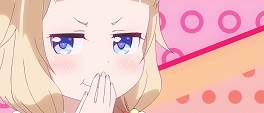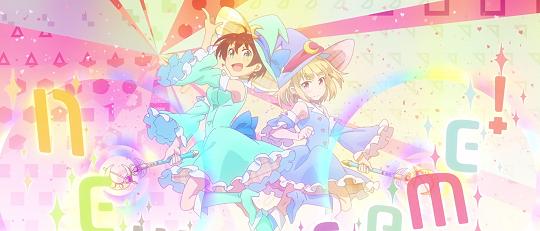Up until New Game! it seemed that P.A. Works held a monopoly on the “earnest girls working earnestly” genre, one it ostensibly started back in 2011 with Hanasaku Iroha and most recently with Sakura Quest. But here’s New Game! with its, admittedly still teenage, protagonist Aoba starting work in the video game production company Eagle Jump, aiming to be a character designer like her idol, Kou Yagami.
Faithfully adapted from the 4 panel manga by Shoutarou Tokunou, the two series of New Game! follow Aoba from a furtive newbie as she navigates both working life as well as commercial creativity. The question then is, can it hold its own in the same genre as Shirobako?
Were you to take the first series on its own, the answer would be a resolute “no”. The 100% female, overtly sapphic, sporadically lascivious and stylistically infantilised characters do it no favours from the off, and the lack of any kind of insight into the video game production process means the series seems to be jostling for a position in the overcrowded “cute girls doing cute things” genre.
The second series however, starts to put some weight behind its punches, like an unspoken training montage had taken place in the intervening period. Whereas initially each episode busies itself with the trials and tribulations of working life as a whole - learning new skills, navigating quirky co-workers, that first paycheque - later ones begin to examine the emotional consequence of working in a highly competitive creative business. How do you support someone you feel creatively threatened by? How do you handle rejection that is based upon the market rather than merit? What do you do when your best doesn’t make the grade?
Aoba’s demeanour throughout is the show’s emotional heart and her almost indomitable spirit and affecting positivity navigates the second series through some emotionally weighty patches. Unfortunately it’s that same demeanour that ends up aiming a spotlight on the series’ lionisation of nakedly toxic working practices.
Staying late is seen as common, staying overnight as frequently necessary, consistent revisions without guidance, the list goes on. There’s a temptation to brush them under the table as par for the course, “crunch” being a known part of any video game production schedule. Here though, the practice has its roots set deep and, like Shirobako before it, hints at the kind of social pressure that is put upon performance and perceived effort. Indeed, Aoba even goes as far as to question whether she should even have her first paycheque considering she hasn’t contributed to the company yet.
Were it not for Aoba’s personality, the atmosphere would be crushing, especially so because in reality death from overwork (karoshi, 過労死) is a well known phenomenon, and one that has seen Japan accrue enormous scorn from many international organisations. The onus to give one’s all to one’s company harkens back to the Japanese “economic miracle” from the 1950’s onwards and is the lamentable bannerman for the ideal of community over personal need. When we are shown any element of Aoba’s home life (outside of the one volume spin-off manga on her high-school tenure) it is her working. It isn’t until late into the second series with the introduction of one of Aoba’s school friends that we see her have some downtime, but even then the conversation quickly turns to work; suffice it to say the series would fail a Bechdel-style test regarding talking about something other than work.
The spectre of those working practices mar what is an otherwise hugely gratifying series. Even when two caustic interns are catapulted unceremoniously into the narrative, threatening to rock the boat, the series forges forward towards a satisfying and appropriate conclusion writ in pastel colours and bokeh lighting.
Back to that original question then of whether New Game! can hold its own in the same genre as Shirobako? Even with the second series’ change in tone, very little can stand up to Shirobako’s lightning-in-a-bottle achievement of character drama, industry commentary and production meta-commentary. New Game may strike many of the similar notes regarding creative process but its drama is too sporadic, bite or no, to balance out what is fundamentally a gumbo of different personalities.
Taken in that regard alone though, the two series and accompanying OVA are frankly, a huge amount of fun. Long has it been since I rushed home from work for anime, ready to put on the latest episode and get lost in the escapades of Aoba, her gravelly-voiced cohort Nene or the acutely introverted Hifumi. In a way, it’s almost as if the later series’ drama gives purpose and merit to a series that seemed to be heading for a full descent into K-On esque iyashkei. Without that turmoil, the question of where the series sat with regard to its peers would be very different.
It may not have a lot to say, but what New Game does it says it well and with a pep and verve that is enormously charming. Almost charming enough to make you forget that 80 hour monthly overtime statistic...








